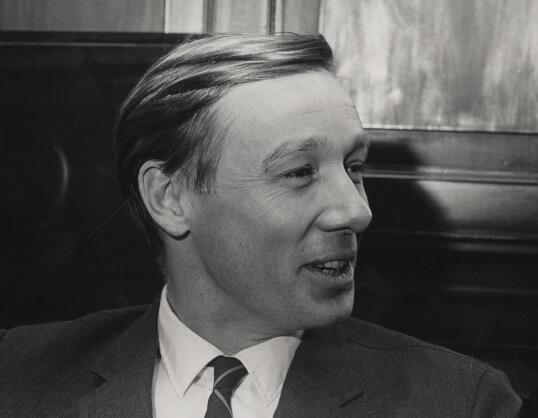
Aug. 15, 2013
The capacity for change
VCU’s first provost, Francis J. Brooke III, made a lasting impact
Share this story
Francis J. Brooke III, Ph.D., who died on July 20 at the age of 84, arrived in Richmond in the summer of 1968, within weeks of the merger between Richmond Professional Institute and the Medical College of Virginia, to take on the role of vice president of academic affairs for the newly created VCU. However, with the change in the masthead came a change in the administration. The former president of RPI, Rowland Nelson, left to take a position at Marshall University, leaving the position of president of VCU empty until the Board of Visitors appointed Warren W. Brandt, Ph.D., the following year.
“So here’s Dr. Brooke, just arrived, a brand new university just come into being and he’s suddenly the chief academic officer on this campus,” said John T. Kneebone, Ph.D., chairman of the VCU Department of History in the College of Humanities and Sciences. “He was responsible when school began for the very first convocation address … Pretty much, Dr. Brooke was on his own there for the first year.”
Inspired by uprisings in Paris the previous year, student demonstrations and protests across the United States were fairly common in 1969. Universities from Columbia to Harvard saw undergraduates gathering to protest against the Vietnam War, racial discrimination and oppressive policing in their communities.
“Almost overnight we ended up with universities as the scene of student protests and radicalism and a whole bunch of hippies smoking pot,” said Kneebone.
So, when a group of about 30 students showed up at Brooke’s office on Monday, May 28, 1969, to discuss a list of grievances, the local press jumped at the idea of civil unrest having finally reached Richmond.
According to VCU’s student newspaper of the time, Proscript, the student group at first tried to hold the meeting outside the administration building (which was located then in Founders Hall, 827 W. Franklin St.), but when Brooke refused to come out and engage with them, the students moved into his office.
Predominantly, the group of students was focused on petitioning for more African-American faculty members, recruitment of more African-American students, more courses focused on African-American studies, an increase in purchasing of African-American related subject material for the library and a number of other grievances.
“Obviously we do not have enough black studies, black faculty, black students,” Brooke told the group after reviewing its list of grievances. “Everything is not OK.”
He continued, “It is a fact of life that there is a considerable backlash in this entire nation against students. Any group of students, whether they be black or white or whatever, can create a backlash against this university by sitting in, however peaceful sitting in looks.”
“The general public,” he said, “cannot distinguish or will not distinguish between a non-disruptive sit-in and an occupancy of the building. The public will have trouble understanding that you did not block my office. If this happens, there will for sure be a backlash against this institution at a time when, the middle of next week, the budgetary tour of the General Assembly will arrive at this campus. If the general public and members of the General Assembly feel that there is an occupancy, a demonstration or any hint of violence here, then the thing we can be pretty afraid of is the money spigot to this institution stands a good chance of being turned down, cut off, and this will damage students here, black and white.”
As a result of Brooke’s work with the student organization, VCU added courses in African-American studies for the 1970 spring semester, books were bought and added to the library and additional resources were made available to address other grievances.
The following week, the Virginia House of Representatives commended Brooke and the group of students for the orderly and non-violent meetings. The House and Senate also passed a motion asking the provost to submit to the Student Government Association weekly progress reports on actions taken by the administration regarding student demands.
“I think he helped in a lot of ways with tensions over the next few years on campus,” said Kneebone.
VCU’s Board of Visitors appointed Brooke as the academic campus’ first provost in September 1973.
During Brooke’s tenure from 1968-1980, VCU added more than 30 degree programs. He left VCU in 1980 to take up the position of president at Columbus State University in Georgia.
In speaking of Brooke’s legacy at VCU, Kneebone commended him on helping to develop a “small underfunded professional school” into a national-caliber public research university.
“And the fact that thousands of people got a good education at VCU really is a legacy of his,” said Kneebone.
Brooke sat down with Proscript in the summer of 1969 to reflect on his first year at VCU.
“I suppose this is about the most interesting university I know of,” said Brooke. “Its challenge is as great as any other institution. Its potential is enormous and in comparison to most universities, it is extremely flexible; that is, it has the capacity for change.”
Brooke is survived by his wife, Helen Morgan Brooke; three sons, Francis John Brooke, Haynes Morgan Brooke and David Tucker Brooke; and eight grandchildren.
Subscribe for free to the weekly VCU News email newsletter at http://newsletter.news.vcu.
Subscribe to VCU News
Subscribe to VCU News at newsletter.vcu.edu and receive a selection of stories, videos, photos, news clips and event listings in your inbox.










